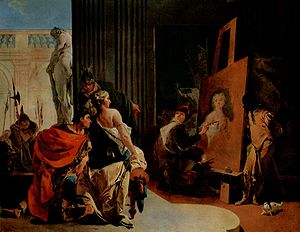
Campaspe
Encyclopedia

Larissa
Larissa is the capital and biggest city of the Thessaly region of Greece and capital of the Larissa regional unit. It is a principal agricultural centre and a national transportation hub, linked by road and rail with the port of Volos, the city of Thessaloniki and Athens...
. She was painted by Apelles
Apelles
Apelles of Kos was a renowned painter of ancient Greece. Pliny the Elder, to whom we owe much of our knowledge of this artist rated him superior to preceding and subsequent artists...
, who had the reputation in Antiquity
Classical antiquity
Classical antiquity is a broad term for a long period of cultural history centered on the Mediterranean Sea, comprising the interlocking civilizations of ancient Greece and ancient Rome, collectively known as the Greco-Roman world...
for being the greatest of painters. The episode occasioned an apocryphal exchange that was reported in Pliny's Natural History: seeing the beauty of the nude portrait, Alexander saw that the artist appreciated Campaspe (and loved her) more than he. And so Alexander kept the portrait but presented Campaspe to Apelles. "So Alexander gave him Campaspe as a present, the most generous gift of any patron and one which would remain a model for patronage and painters on through the Renaissance" Robin Lane Fox remarked.
Apelles also used Campaspe as a model for his most celebrated painting of Aphrodite 'rising out of the sea', the iconic Venus Anadyomene
Venus Anadyomene
Venus Anadyomene was one of the iconic representations of Aphrodite, made famous in a much-admired painting by Apelles, now lost, but described in Pliny's Natural History, with the anecdote that the great Apelles employed Campaspe, a mistress of Alexander the Great, for his model...
, "wringing her hair, and the falling drops of water formed a transparent silver veil around her form".
No Campaspe appears in what we have of the five major sources for the life of Alexander. Alexander's modern biographer Robin Lane Fox
Robin Lane Fox
Robin Lane Fox is an English historian, currently a Fellow of New College, Oxford and University of Oxford Reader in Ancient History.-Life:Lane Fox was educated at Eton and Magdalen College, Oxford....
traces her legend back to the Roman authors Pliny (Natural History), Lucian of Samosata and Aelian
Aelian
Aelian or Aelianus may refer to:* Aelianus Tacticus, Greek military writer of the 2nd century, who lived in Rome* Casperius Aelianus, Praetorian Prefect, executed by Trajan...
's Varia Historia. They would have it that Campaspe was a prominent citizen of Larissa
Larissa
Larissa is the capital and biggest city of the Thessaly region of Greece and capital of the Larissa regional unit. It is a principal agricultural centre and a national transportation hub, linked by road and rail with the port of Volos, the city of Thessaloniki and Athens...
in Thessaly; Aelian surmised that she initiated the young Alexander in love.
Campaspe became a generic poetical synonym
Synonym
Synonyms are different words with almost identical or similar meanings. Words that are synonyms are said to be synonymous, and the state of being a synonym is called synonymy. The word comes from Ancient Greek syn and onoma . The words car and automobile are synonyms...
for a man's mistress; The English University wit and poet John Lyly
John Lyly
John Lyly was an English writer, best known for his books Euphues,The Anatomy of Wit and Euphues and His England. Lyly's linguistic style, originating in his first books, is known as Euphuism.-Biography:John Lyly was born in Kent, England, in 1553/1554...
(1553–1606), who produced his comedy Campaspe
Campaspe (play)
Campaspe is an Elizabethan era stage play, a comedy by John Lyly. Widely considered Lyly's earliest drama, Campaspe was an influence and a precedent for much that followed in English Renaissance drama.-Performance and publication:...
in 1584, also wrote:
- "Cupid and my Campaspe play'd
- At cards for kisses—Cupid paid:
- He stakes his quiver, bow and arrows,
- His mother's doves, and team of sparrows;
- Loses them too; then down he throws
- The coral of his lip, the rose
- Growing on's cheek (but none knows how);
- With these, the crystal of his brow,
- And then the dimple of his chin:
- All these did my Campaspe win.
- At last he set her both his eyes,
- She won, and Cupid blind did rise.
- O Love! has she done this to thee?
- What shall (alas!) become of me?"
The Spanish playwright Pedro Calderón de la Barca
Pedro Calderón de la Barca
Pedro Calderón de la Barca y Barreda González de Henao Ruiz de Blasco y Riaño usually referred as Pedro Calderón de la Barca , was a dramatist, poet and writer of the Spanish Golden Age. During certain periods of his life he was also a soldier and a Roman Catholic priest...
wrote his own play on the Campaspe story, Darlo todo y no dar nada (1651).

